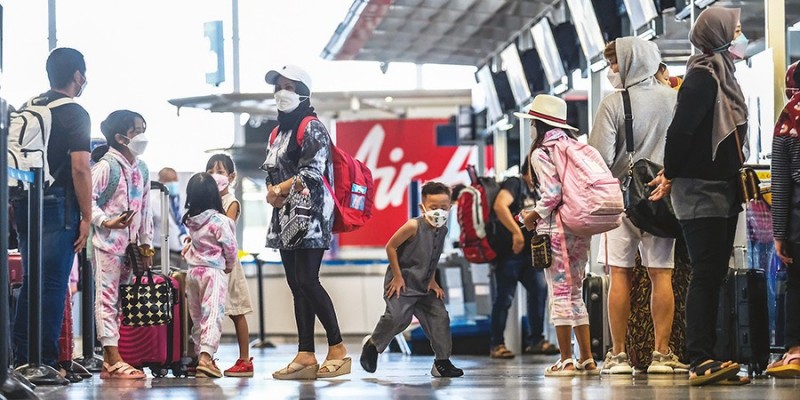
TOURISM-RELATED industries such as hotels, event management, food and beverage, and aviation would be the primary beneficiaries of Malaysia’s economic reopening.
According to Bank Islam Malaysia Bhd chief economist Dr Mohd Afzanizam Abdul Rashid, the economy reopening is important in boosting the recovery of the above-mentioned sectors.
However, he said their recovery would take some time as the Covid-19 pandemic has engulfed all parts of the world.
“This is especially true when the number of new cases is still high by the global standards.
“This would mean that the public will continue to be cautious in their spending and travel plans,” he told The Malaysian Reserve recently.
Mohd Afzanizam believed that the government should approach this situation more or less the same way but with a focus on reducing and mitigating the pain and suffering of those who are still affected.
“This means that cash transfers, grants, microfinancing and training will continue to be the mainstay.
“Beyond such assistance is obviously capacity building especially in regards to education, healthcare and infrastructure,” he elaborated.
This would be very much embedded in the 12th Malaysia Plan whereby the sizable allocation for development expenditure will be the key factor in driving the recovery process in a more sustainable manner.
Therefore, this is a combination of meeting the citizens’ short-term needs and fulfilling the aspirations of Malaysia to be a developed nation by 2030.
With the government’s decision to resume interstate travel, TA Securities Holdings Bhd analyst Tan Kam Meng expected domestic travel to observe a significant boost.
With the Budget 2022 announcement around the corner, he hoped to see more positive measures for the aviation industry such as the individual tax relief, which can be increased to more than RM1,000.
The government has also opened Malaysia’s international borders, but only for business and visiting families.
However, Tan felt that it is too early to talk about receiving foreign tourists even if international borders are reopened for leisure travelling.
“Malaysians may not be able to enter other countries because their borders are not open yet but international travel is certainly good for the aviation industry,” he added.
Tan hoped that Malaysia can see more measures on Covid-19 testing and quarantine issues, which he thought are still unclear.
“Travellers want peace of mind. I think it is not about the pre-sales or giving big discounts on tickets, but more on ensuring passengers feel safe to fly and be clear on the quarantine issues,” he added.
During the lockdown period, the aviation industry was only supported by cargo, which is of a low volume and they were hit the worst during the second quarter of 2020.
Tan believed that the worst is yet to be over but the chances of another lockdown would be slim due to Malaysia’s high Covid-19 vaccination rates.
Meanwhile, Malaysian Budget and Business Hotel Association president Emmy Suraya Hussein welcomed the government’s decision to reopen the interstate borders as this would definitely help hotels raise their occupancy.
“For Kuala Lumpur and Selangor, this is where the economy and the buying powers are so, if these two states are not opened, it is similar to not opening the country’s economy,” she said.
Emmy Suraya also hoped that the government would come up with clearer guidelines and standard operating procedures for the hotel sector and for hotel operators to adhere to the regulations set by the National Security Council to avoid any potential Covid-19 clusters.
“Consumers may have already made bookings for upcoming public holidays like Deepavali and Awal Muharam.
“Since the interstate travel was announced, we have had a lot of inquiries asking about rates and room availability,” she said.
Emmy Suraya expected places with resorts such as Pahang, Penang, Melaka and Port Dickson to have the most hotel bookings.
Meanwhile, the Entrepreneur Development and Cooperatives Ministry (Medac) welcomed the resumption of cross-state travel, saying that this is the best step and opportunity for the people, especially micro-entrepreneurs and small and medium enterprises (SMEs) to revive their businesses and most importantly, to continue their survival.
“There are a total of 37,415 entrepreneurs who have gone bankrupt during this pandemic.
“Out of this, 26,007 are micro-businesses, while the remaining 2,738 are SMEs,” Medac said in a statement yesterday.
Its minister Tan Sri Noh Omar said there will be 11 agencies to ensure that all initiatives and pac-kages introduced by the government reach the affected SMEs.
“This covers the target group, the value of funding, assistance, grant rate, programme scope and implementation mechanism.
“The focus groups include entrepreneurs and cooperatives affected by Covid-19, those who are retrenched and interested in becoming entrepreneurs and unemployed graduates, the asnaf, as well as entrepreneurs who use their own capital,” Noh said.
Medac said it remained committed to the agenda of creating a Nation of Entrepreneurs, which aligns with the aspiration of Keluarga Malaysia.
“As efforts to improve economic balance in less developed regions, the emphasis on entrepreneurship will be enhanced as one of the potentials more comprehensive income generation opportunities,” it stated.
Source: https://themalaysianreserve.com/2021/10/13/tourism-to-benefit-most-from-economic-reopening/

